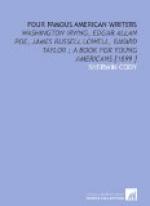I thought of a mound in sweet Auburn
Where a little headstone stood;
How the flakes were folding it gently,
As did robins the babes in
the wood.
Up spoke our own little Mabel,
Saying, “Father, who
makes it snow?”
And I told of the good All-father
Who cares for us here below.
Again I looked at the snow-fall,
And thought of the leaden
sky
That arched o’er our first great
sorrow,
When that mound was heaped
so high.
I remembered the gradual patience
That fell from that cloud
like snow,
Flake by flake, healing and hiding
The scar that renewed our
woe.
And again to the child I whispered,
“The snow that husheth
all,
Darling, the merciful Father
Alone can make it fall!”
Then with eyes that saw not, I kissed
her;
And she, kissing back, could
not know
That my kiss was given to her sister,
Folded close under deepening
snow.
Lowell’s greatest poem, “The Vision of Sir Launfal,” was written in the same simple, beautiful spirit of “The First Snow-Fall,” and that is why we all like to read it over and over again. “Sir Launfal” was a favorite with Mrs. Lowell from the beginning. She probably knew better that it was a great poem than the poet himself did.
The “Prelude” to the first part is beautiful because it contains so much that cannot but touch the heart of every one, however he may dislike poetry. A great poem like this cannot be read hastily, nor must we stop with reading it once. Great poetry must be read so many times that it is committed entirely to memory before we begin to reach the end of the beauties in it. Each time we reread we see new beauties, we feel new thrills.
Over his keys the musing organist,
Beginning doubtfully and far
away,
First lets his fingers wander as they
list,
And builds a bridge from Dreamland
for his lay;
Then, as the touch of his loved instrument
Gives hope and fervor, nearer
draws his theme,
First guessed by faint auroral flashes
sent
Along the wavering vista of
his dream.
The first time you read this passage it may mean little to you; but as you read again and again you gradually picture in your mind a grand cathedral, just filling with people for the morning worship. The organist begins with a few light notes, fanciful, merely suggestive; then louder and louder swells the strain; the music begins to bring up before your mind pictures of waterfalls, cities, men and women with passionate hearts; at last, in the grand flood of the music, you forget yourself, the world around you, the church, the thronging congregation, everything.
After this pretty and suggestive prelude, describing the musician, we read such passages as this, which suggest the theme as by a “faint auroral flash”:
And what is so rare as a day in June?
Then, if ever, come perfect
days;
Then Heaven tries earth if it be in tune,
And over it softly her warm
ear lays.




